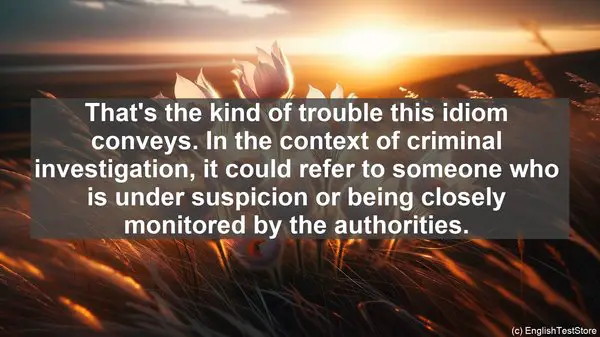Introduction: The World of Criminal Investigation
Welcome to today’s lesson. We’re diving into the fascinating world of criminal investigation, but with a twist. Instead of discussing the usual techniques and procedures, we’ll be exploring the language side of things. Specifically, the top 10 English idioms that are commonly used in this field. So, whether you’re a student, a language enthusiast, or even a detective yourself, this lesson is for you. Let’s get started!
1. ‘Caught Red-Handed’
Our first idiom is ‘caught red-handed’. It’s often used to describe someone who is caught in the act of doing something wrong or illegal. The origin of this phrase goes back to the days when hunting was a common activity. If a person was caught with the blood of a freshly killed animal on their hands, it was clear evidence of their guilt. Over time, the phrase has come to be used in various contexts, including criminal investigations.
2. ‘In Hot Water’
Next up, we have ‘in hot water’. This idiom is used to describe someone who is in trouble or facing difficulties. The imagery here is quite vivid. Imagine being in a situation where the water is boiling, and you’re right in the middle of it. That’s the kind of trouble this idiom conveys. In the context of criminal investigation, it could refer to someone who is under suspicion or being closely monitored by the authorities.
3. ‘On Thin Ice’
Moving on, we have ‘on thin ice’. This idiom is often used to warn someone that they are in a risky or precarious situation. The image of walking on thin ice is a powerful one. It suggests that any wrong move could lead to disaster. In the world of criminal investigation, this idiom could be used to caution someone who is treading a fine line between legality and illegality.
4. ‘A Smoking Gun’
Our next idiom, ‘a smoking gun’, is particularly relevant in criminal investigations. It refers to a piece of evidence that is undeniable and clearly points to someone’s guilt. The term originated from the idea that when a gun is fired, it produces smoke. So, if a gun is found ‘smoking’ at a crime scene, it’s a strong indication of who the perpetrator might be. Over time, the phrase has come to be used more broadly, beyond just literal guns.
5. ‘Covering Your Tracks’
In the world of criminal investigation, it’s not uncommon for perpetrators to try and hide their actions. That’s where our next idiom, ‘covering your tracks’, comes into play. It means to take steps to conceal or hide evidence of one’s actions. The imagery here is quite straightforward. Just like someone walking in the snow can try to cover their footprints, a person involved in a crime might try to cover up any traces that could lead back to them.
6. ‘Under the Radar’
Sometimes, individuals involved in criminal activities manage to stay undetected by the authorities. This is where the idiom ‘under the radar’ comes in. It means to go unnoticed or to avoid attracting attention. In the context of criminal investigation, it could refer to someone who is operating discreetly, making it harder for the authorities to catch them.
7. ‘To Have a Skeleton in the Closet’
Our next idiom, ‘to have a skeleton in the closet’, is not exclusive to criminal investigation, but it’s certainly relevant. It means to have a secret or embarrassing fact about oneself that, if revealed, could have serious consequences. In the context of criminal investigations, this idiom could refer to someone who has a hidden past or involvement in illegal activities.

8. ‘To Let Someone Off the Hook’
In criminal investigations, the goal is to hold the guilty party accountable. However, sometimes, due to various reasons, a person might not face the consequences of their actions. This is where the idiom ‘to let someone off the hook’ comes in. It means to not hold someone responsible or to not punish them for something they’ve done. This idiom can also be used in non-criminal contexts, but in the world of investigations, it has a particular significance.
9. ‘To Be in the Clear’
When someone is suspected of a crime, there’s often a period of uncertainty. Will they be found guilty or not? However, if the evidence or circumstances point to their innocence, they can be said to be ‘in the clear’. This idiom means to be free from suspicion or to have no further obstacles in one’s path. It’s a phrase that brings a sense of relief, both in criminal investigations and in everyday situations.
10. ‘To Crack the Case’
Finally, we have ‘to crack the case’. This idiom is used to describe the successful resolution of a criminal investigation. The word ‘crack’ here conveys the idea of breaking through a barrier or solving a complex puzzle. It’s a moment of triumph for the investigators when they’re able to uncover the truth and bring the culprits to justice. It’s the ultimate goal in the world of criminal investigation.
Conclusion: The Language of Investigation
And that brings us to the end of our list. These 10 idioms offer a glimpse into the language used in the world of criminal investigation. They’re not just words or phrases; they carry with them a wealth of meaning and history. So, the next time you come across one of these idioms, you’ll have a deeper understanding of what it signifies. Thank you for joining us today, and until next time, happy learning!

